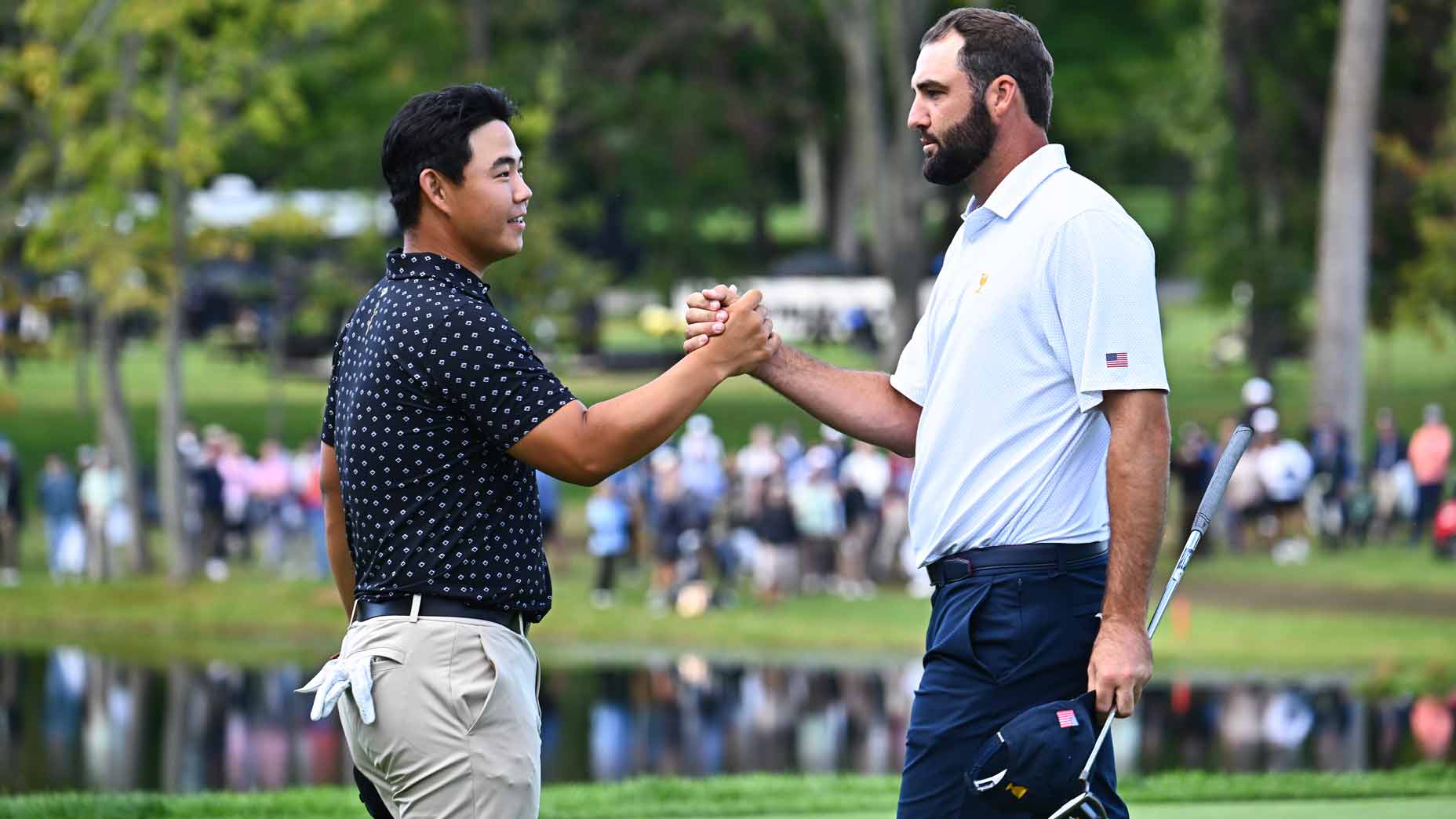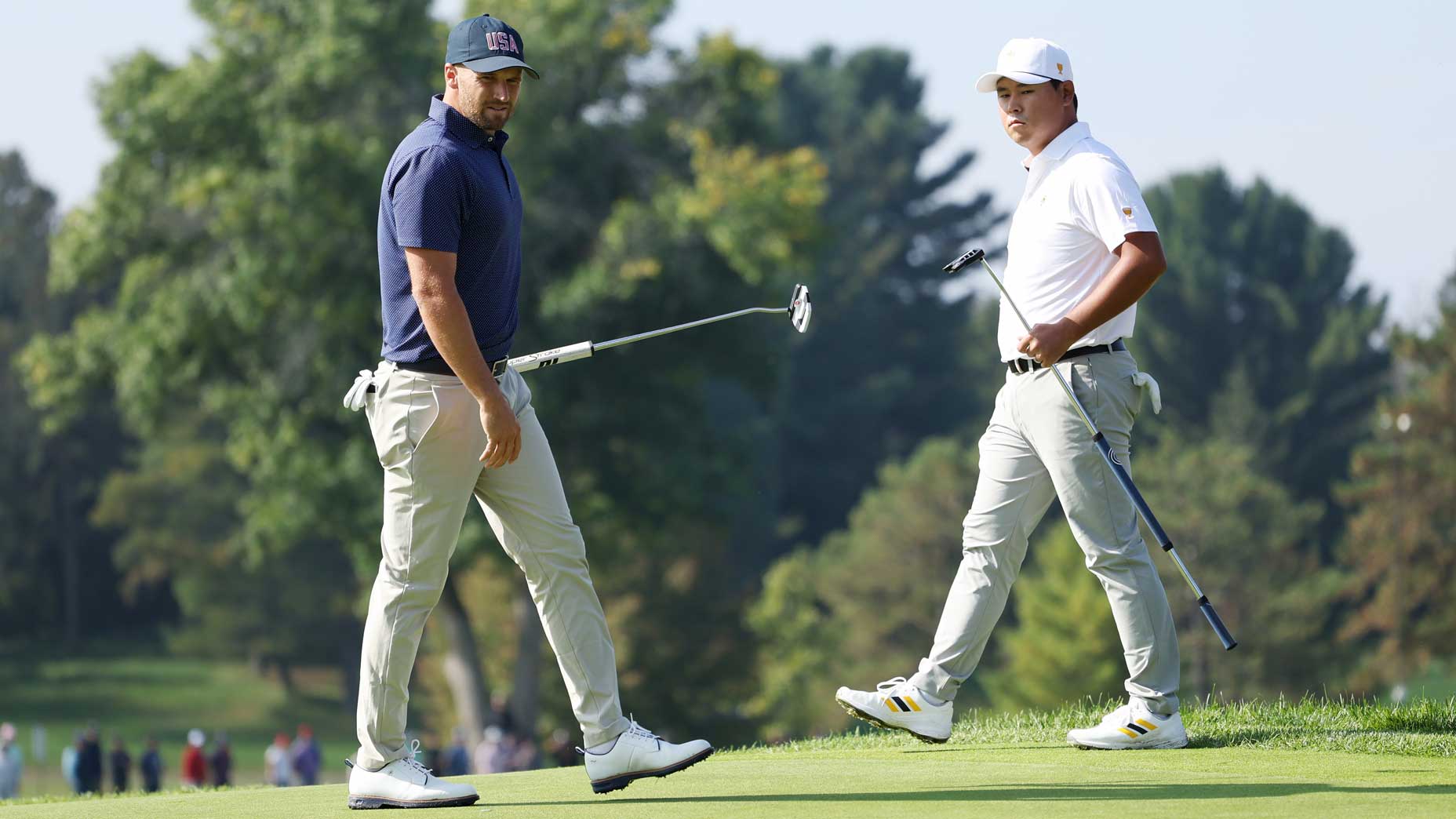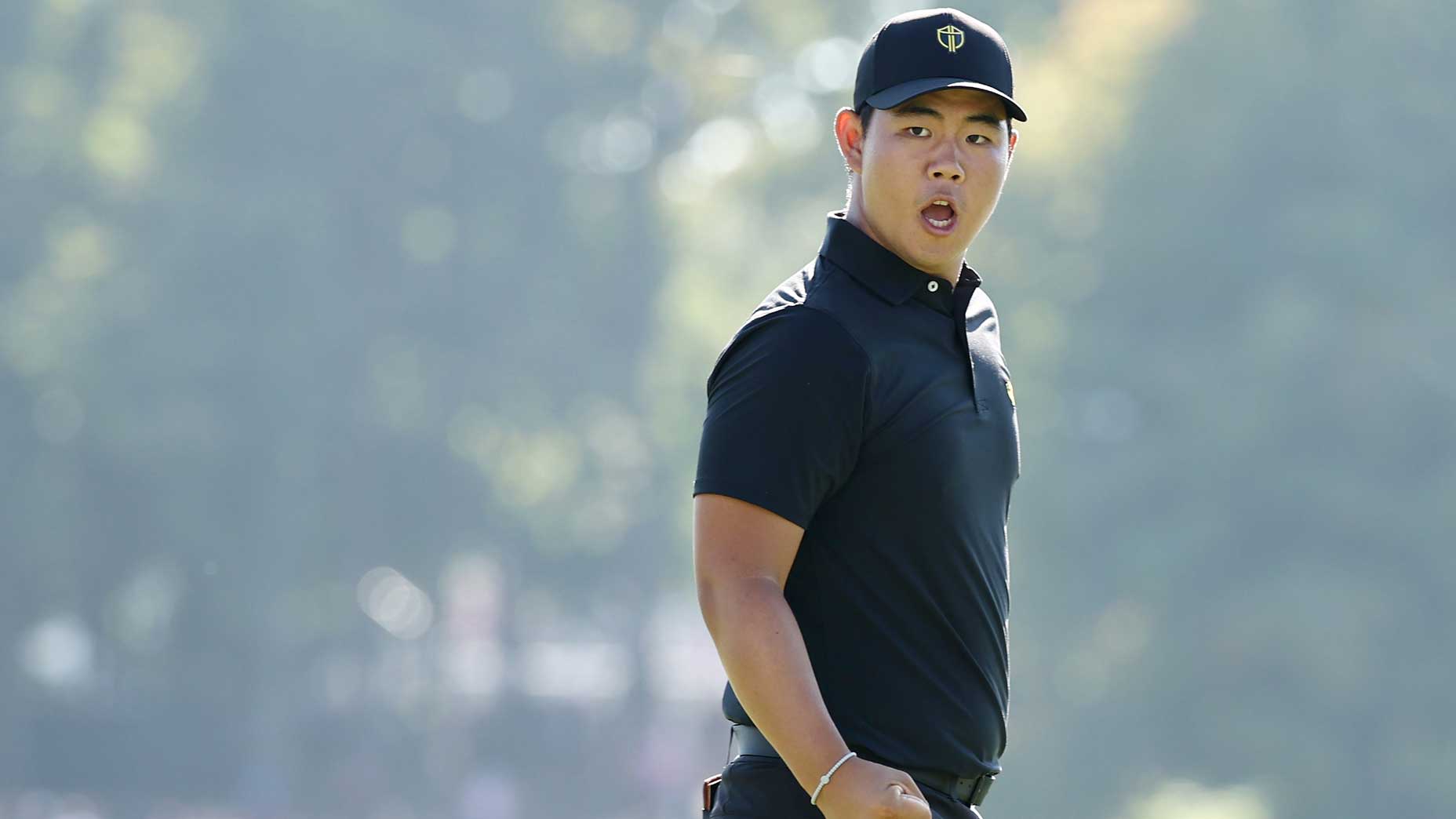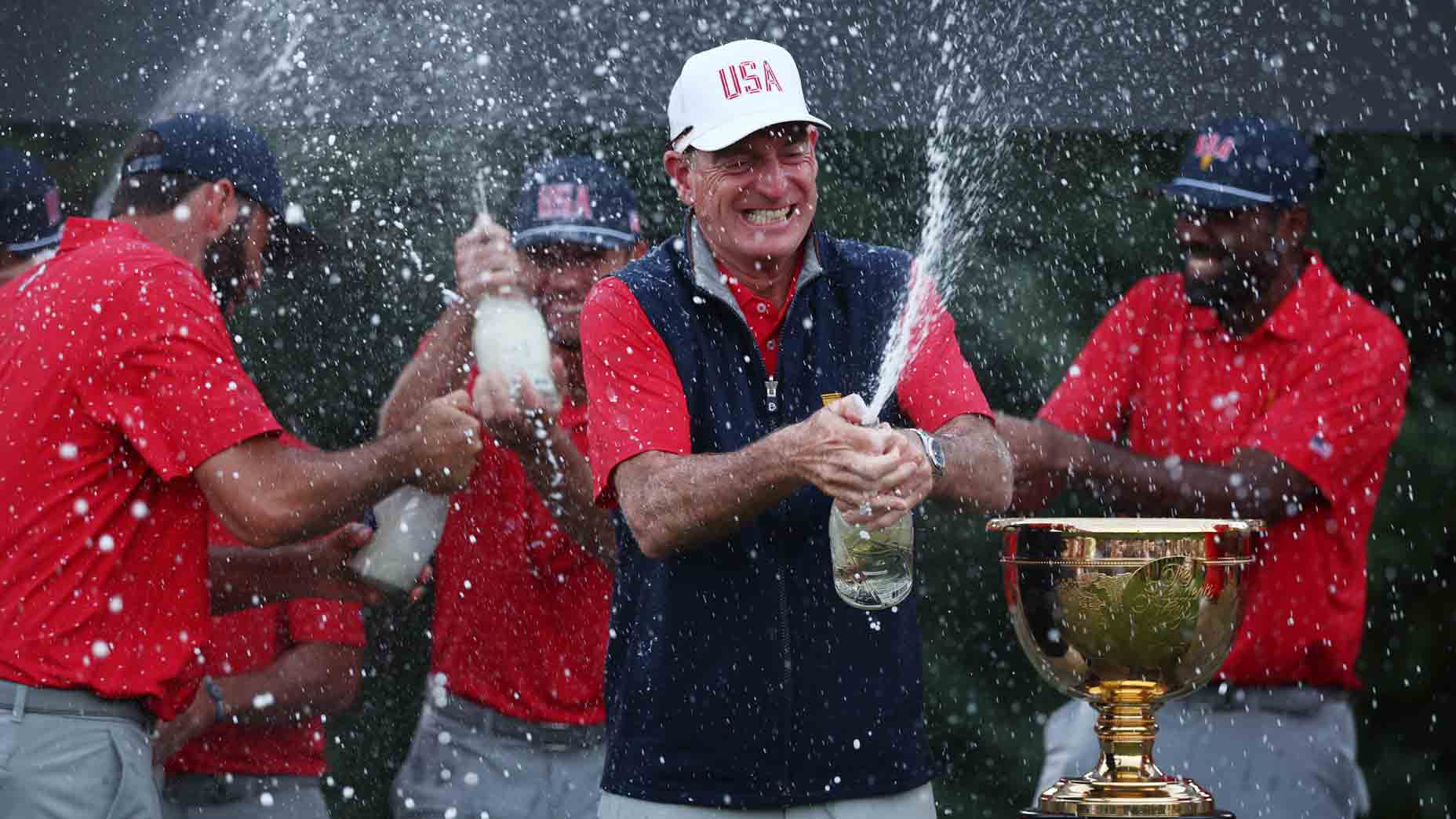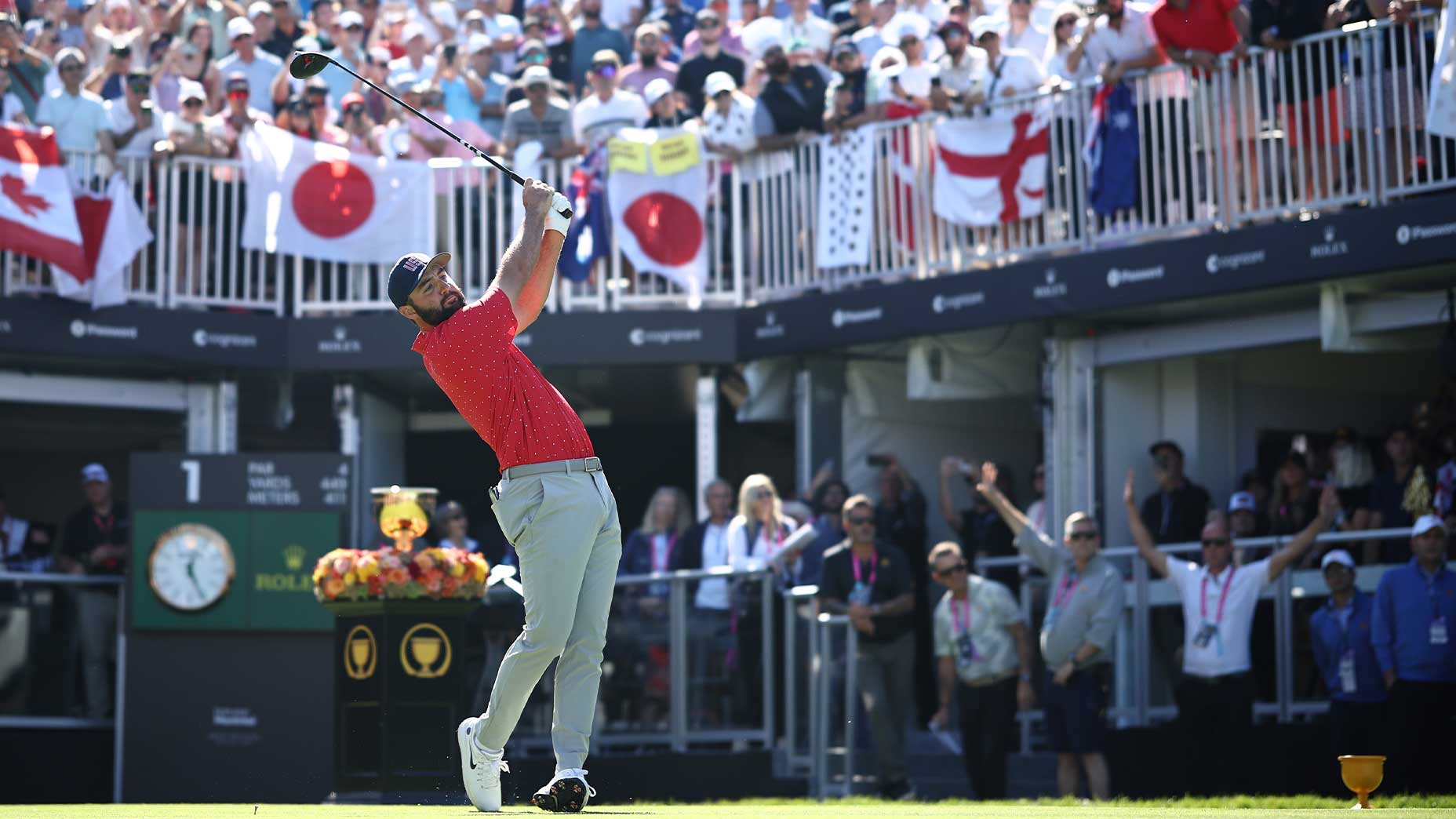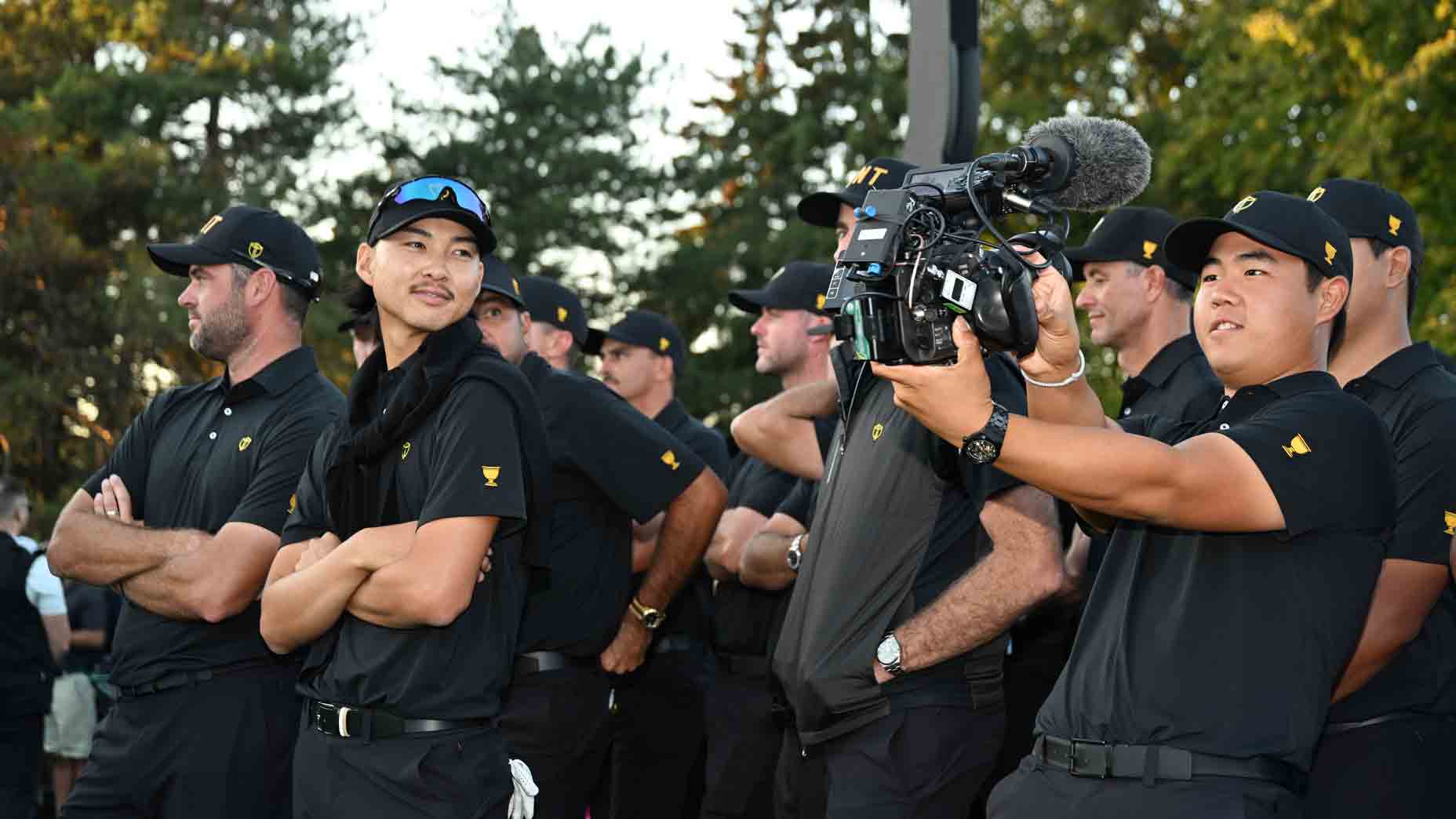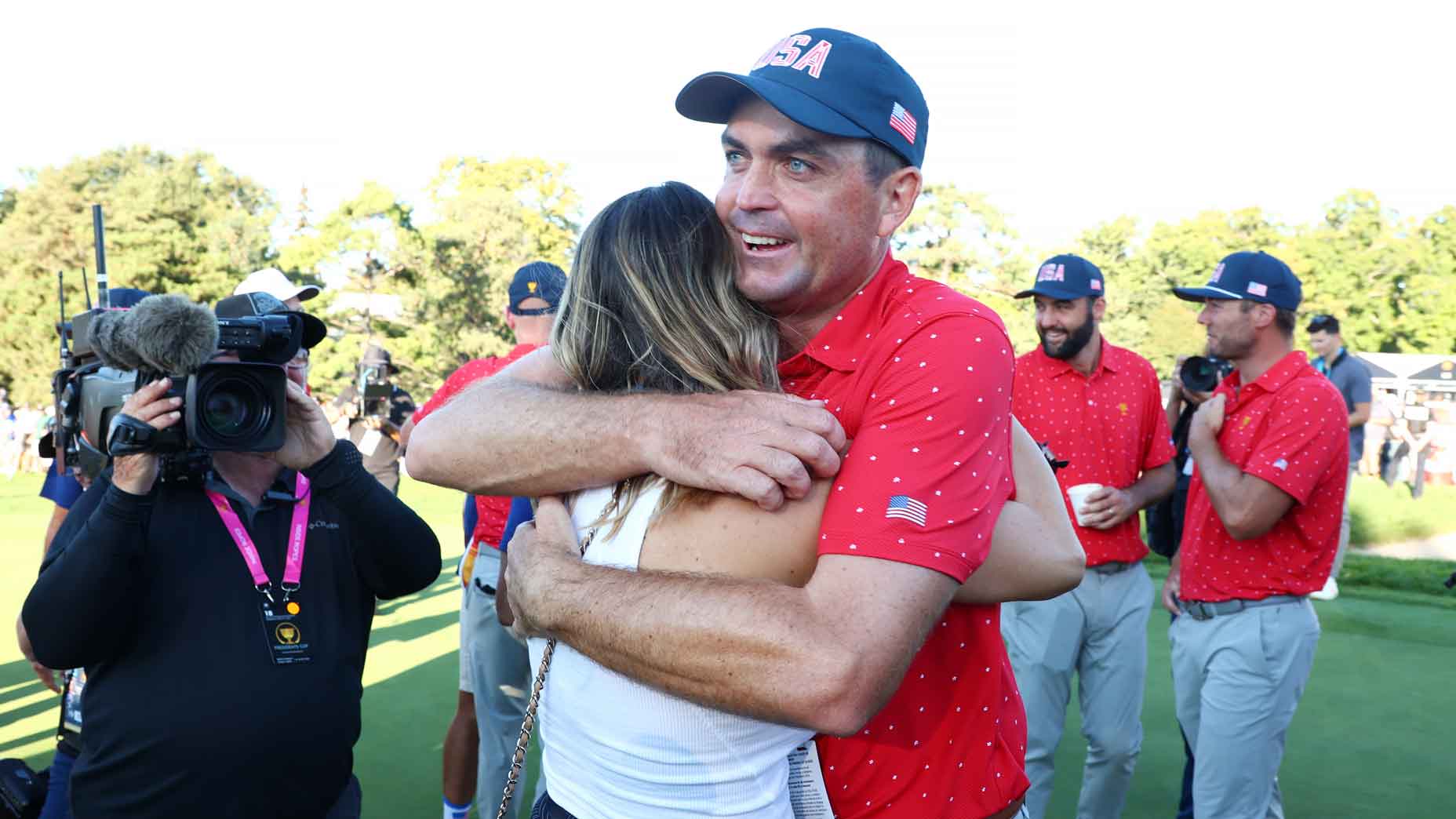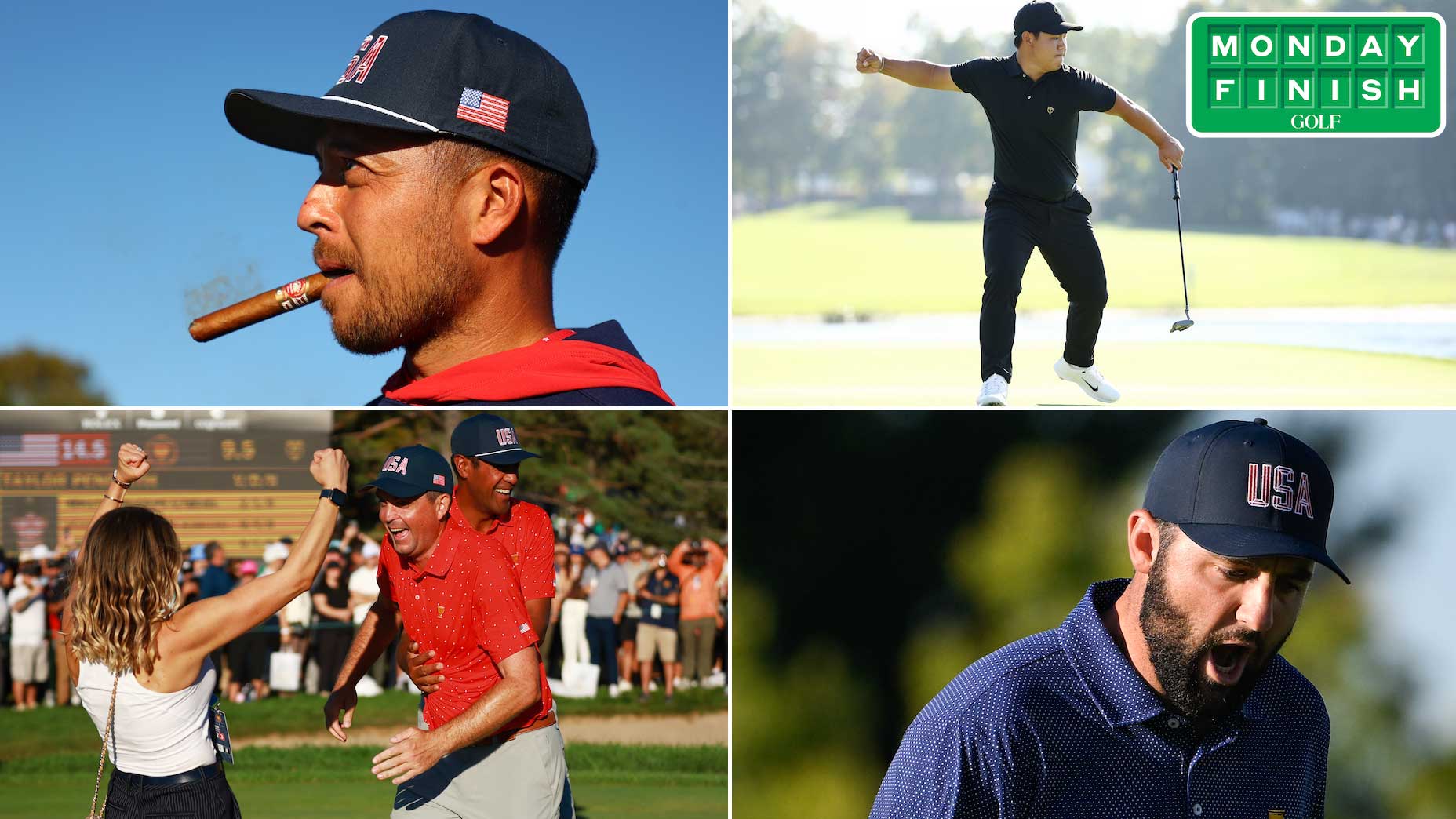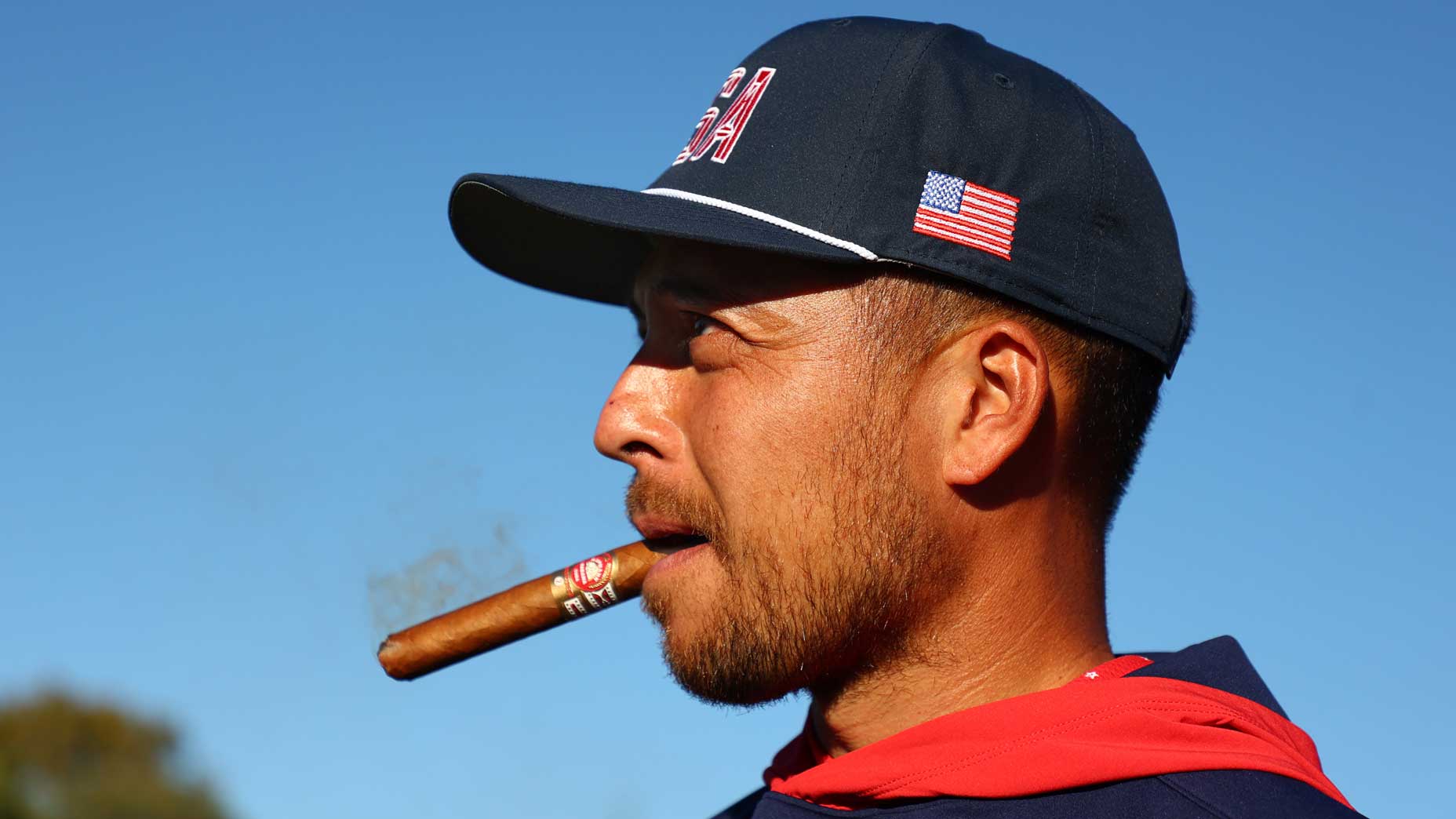Ahead of 2024 election … at 2024 Presidents Cup … we asked about role models
- Share on Facebook
- Share on Twitter
- Share by Email
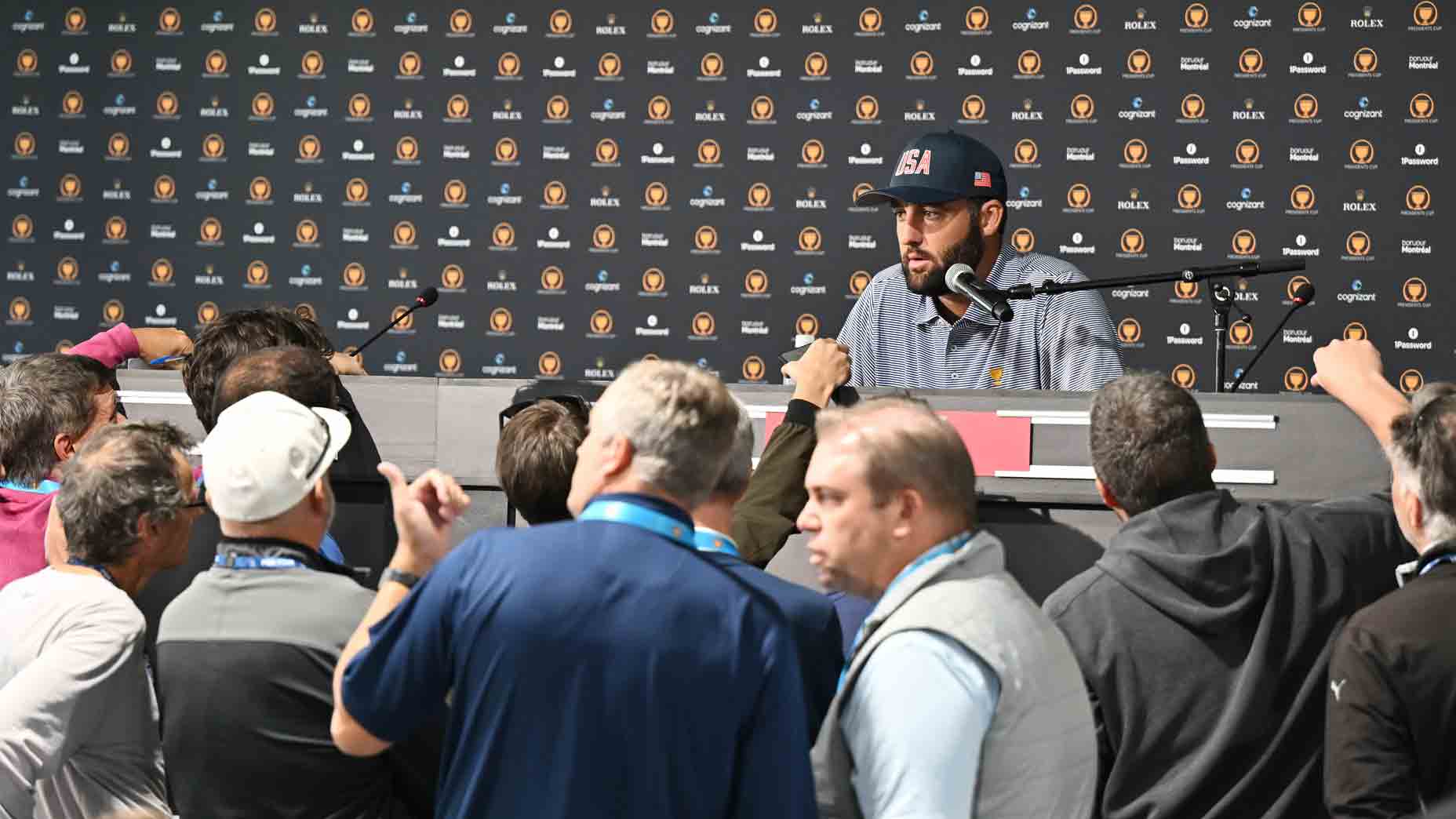
Scottie Scheffler on Tuesday at Royal Montreal.
Getty Images
MONTREAL — Tom Kim? He said Kobe Bryant. Jason Day? He said Roger Federer.
Patrick Cantlay? He named his dad and his granddad.
As for Ben An? He didn’t have one.
Those ruminations, along with others, came from a query that was, all at once, topical, mildly unexpected and cotton-candy fluffy. On Tuesday at elegant Royal Montreal, It was posed by this author, who asked this:
With this being a U.S. presidential election year … and this being the Presidents Cup … it got me thinking about role models. My questions are then, who are your role models, and why?
I then followed up with:
Do you feel an obligation to be a role model?
Yes, yes, I’m fully aware the questions are softballs, and that they’re not even fully golf-related, though that’s partially the reason I asked them. For one, you get an answer. But more notably, I kinda believe that you get a window into who the pros are, which is something drone-like questions don’t provide. It’s a personal question, and you’ll get a personal answer, if the gang is being both honest and sincere.
Below, you can find my conversations. To be transparent, I’ll also answer the question, at the end.
First up, the two captains of the event that starts Thursday.
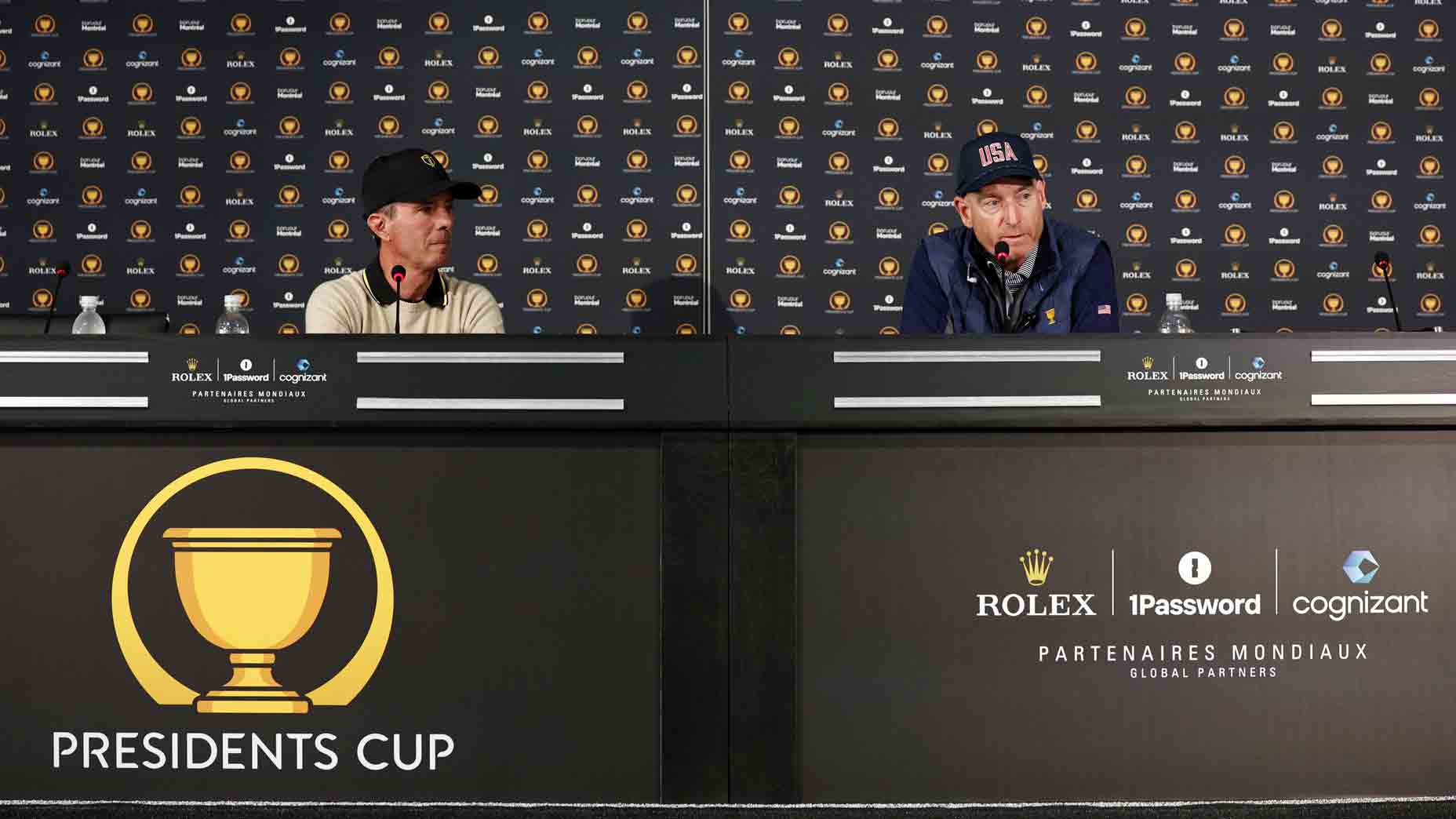
‘We’re going to pick the same guy’
This being a U.S. presidential election year and this being a Presidents Cup, it got me thinking about role models. The question is: Who’s your role model and why?
Jim Furyk: “Sure. I’m not sure how it got to politics. Role models as politicians or role models in the game of golf?”
Me: “However you want to answer.”
Jim Furyk: “We’re going to pick the same guy. I think for him, it’s Jack Nicklaus.”
Mike Weir: “That’s one of them, for sure.”
Furyk: “I’ve heard the story about the letter, and it’s an amazing story. I think I’m going to start with Jack because I played for him in three Presidents Cups. I saw how he integrated himself into the team and how it was amazing for us, for a much, much younger generation to get to know a legend, and the more he got to know us, the more he really got involved with the teams and the pairings and how we went about with our day-to-day preparations.
“Kind of being around the greatest player of all time, or arguably the greatest player of all time, and spending time with he and Barbara, who’s amazing, was absolutely wonderful.
“I think Mike would probably say the same thing. The greatest thing for me about these events — there’s so many wonderful things about the Presidents Cup, the Ryder Cups, but it just brings together so many different generations. I have guys that are on my team that are very similar age to my kids, and I’ve also shared a lot of time with Jack Nicklaus, and have pretty much spanned about a 60-year gap in golf.
“To be able to bridge those gaps and those generations has been wonderful, but Jack’s been my idol.”
Weir: “Yeah, to Jim’s point, obviously Jack for me as well. For those of you who don’t know, I wrote a letter to Jack when I was a young lefty, and there weren’t many lefty Tour players. I thought maybe I should switch to right-handed, and he said stick to left-handed. It’s been a nice story. We’ve been able to go back and forth with it.
“I brought that letter to Memorial, at Jack’s event, and he’s always gotten a kick out of that. They’ve been wonderful to me, he and Barbara, and just such a class guy.
“I’ll go on the international side. Gary Player, getting to know him through the Masters, being around him as a captain in South Africa for the first time, and being here in 2005 as well and 2007. So three times a captain, getting to know him a little bit better.
“What you see is what you get from Gary. It’s real. He really lives that life. He’s really so positive all the time. He’s got a big, huge heart, which I love, and he loves his guys. I’ve kind of tried to bring that with our guys.”
Me: “Just a quick follow-up: Do you guys feel an obligation to be a role model?”
Furyk: “Yes.”
Weir: “Yeah, I try to do my best. I fall short a lot of the times, but try to.”
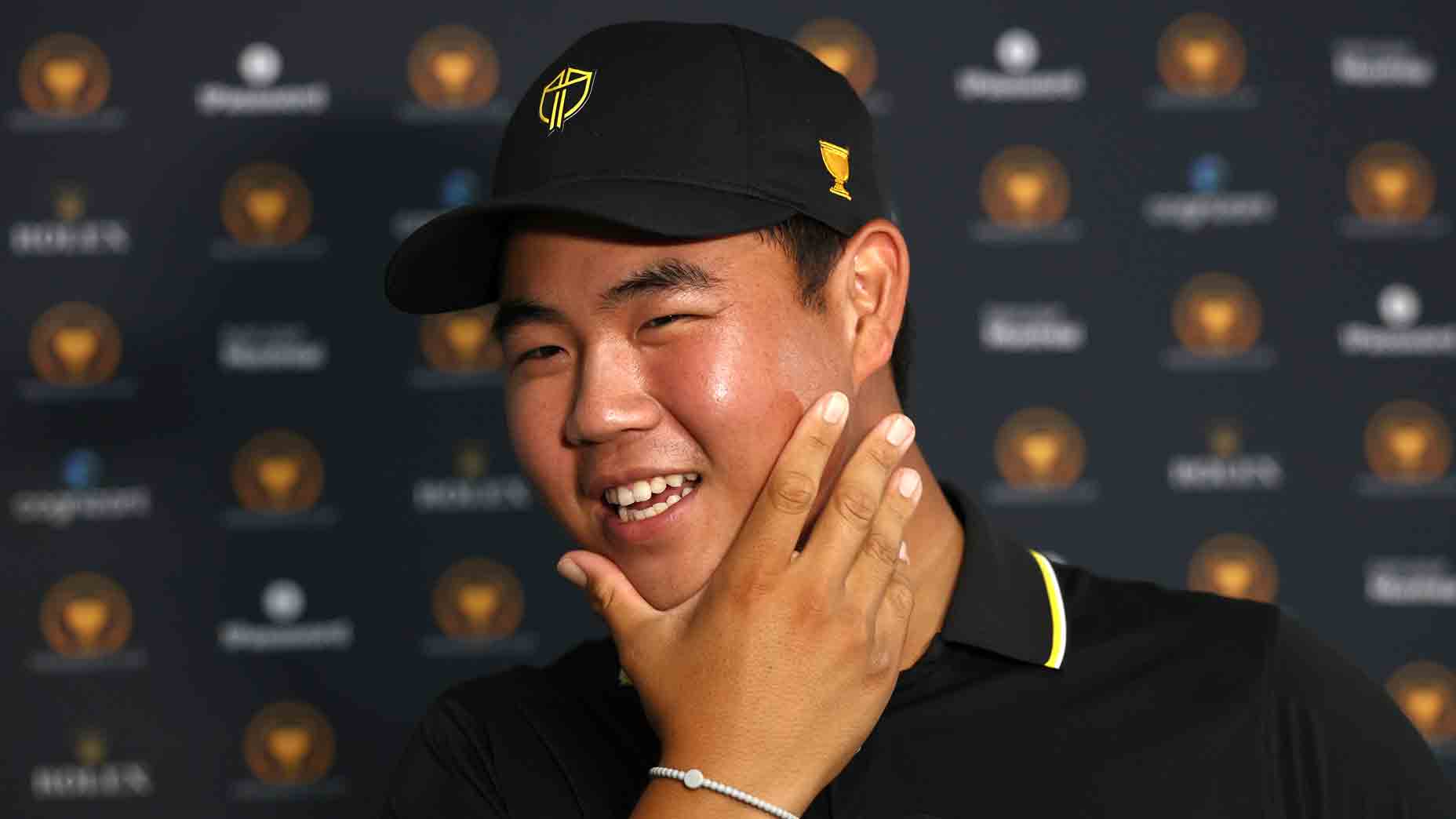
‘Kobe was a guy who was so dedicated to the process’
Tom, this being a U.S. presidential election year and this being a Presidents Cup, it got me thinking about role models. Who’s your role model and why?
Tom Kim: “That’s a good question. Does it need to be an athlete?”
Me: “Whoever you like.”
Kim: “I feel like I really looked up to Kobe Bryant for such a long time. I still do. Kobe was a guy who was so dedicated to the process and the journey to becoming great and never really talked about achieving something.
“And I think the best guys in our sport and all the other sports, they all have a very similar mindset. They’re not trying to achieve something. Of course the goal is to win, but they’re not trying to achieve it. They’re so focused on how to get better. And I think that’s kind of been the mindset I’ve had while I was growing up.
“And it’s something I’ve been feeding off of every time something isn’t working. This year has been a tough season for me. I felt this year was a big learning step for me just to now really loving the part of struggling and trying to get better and figuring things out and not feeling like achieving is everything.”
Me: “Do you feel an obligation to be a role model?”
Kim: “In certain aspects, for sure. Michael Jordan always talked about, Kobe Bryant always talked about the fans paying, they’re saving so much money to go and watch these guys play — playing through injuries and stuff.
“I do feel that in a certain way of, when I’m out on the course, trying to put a smile on my face. Trying to be, when things aren’t going my way, not being so pouty, because there’s kids out there, guys out there who just love the game who have watched you on TV, because I was in those shoes, too.
“I know what it feels like to be outside the ropes and watching these guys play. It’s a constant reminder. It’s not actually easy to consistently remind yourself when things aren’t going well. But when you can put those things in perspective, I feel like it makes life a little easier.”
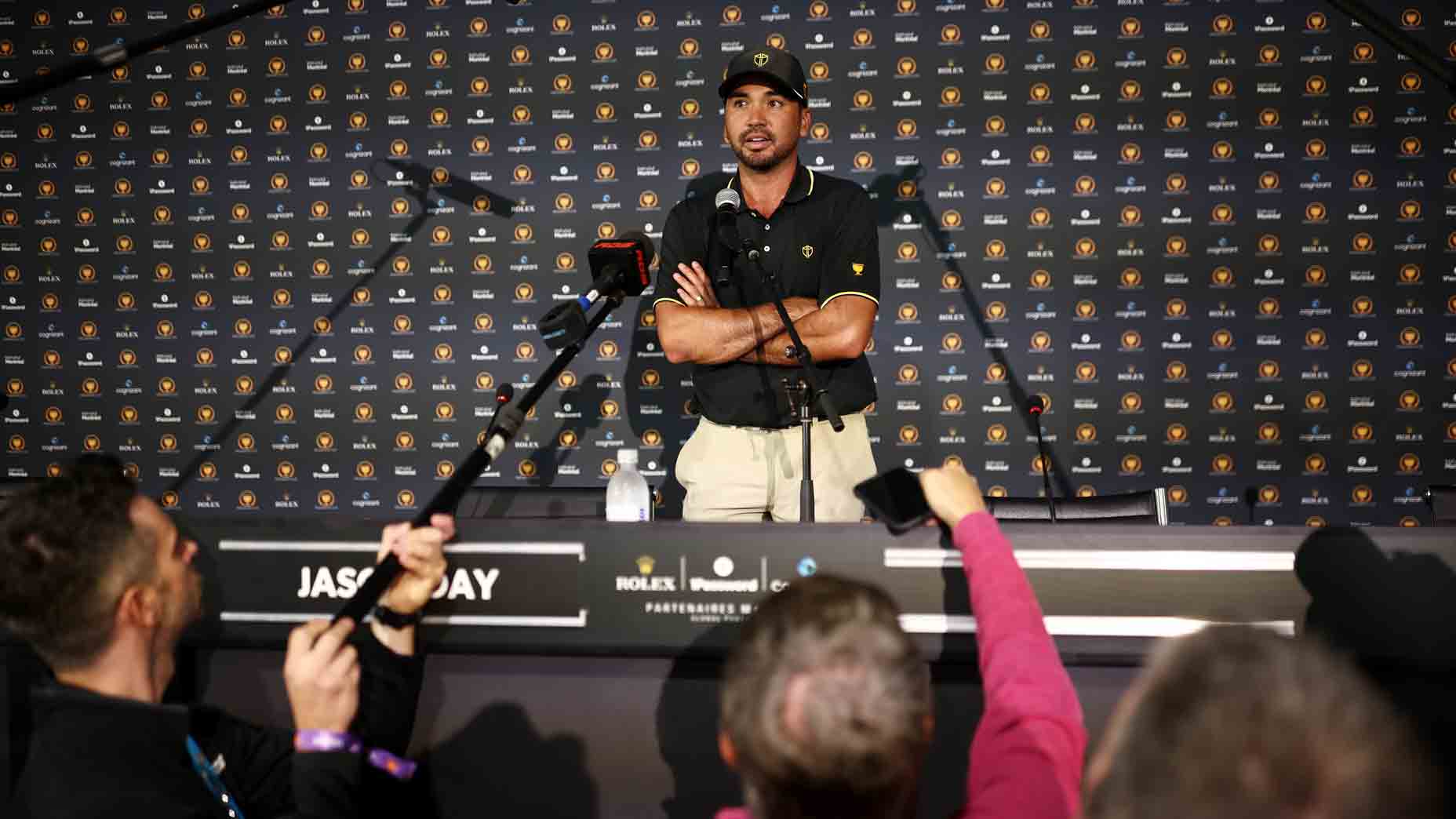
‘He’s a gentleman off the court and on the court’
Jason, this being a U.S. presidential election year and a Presidents Cup, it got me thinking about role models. Who’s your role model and why?
Jason Day: “Are we talking like golf?”
Me: “Whoever you want to answer, yeah.”
Day: “I love Roger Federer. I was actually just talking about him because one of our guys on our team, Andre, he actually worked in the tennis world for a while and then actually was partnered with Roger’s agency, worked with Anthony Godsick, who was manager of Roger, and got to talk to him.
“He’s a gentleman off the court and on the court. The way he played, he was very graceful in that. He’s just someone that I look up to sports-wise is Roger Federer.”
Me: “Do you feel an obligation to be a role model yourself?”
Day: “I try and do my best. I have my weak moments, like everyone does. I know I’m not going to please everyone, but I just try and do the best job I can. If I can play the game in a certain way and make sure that I’m playing it for the good reasons, the right reasons, usually that kind of crosses over into being a role model.”
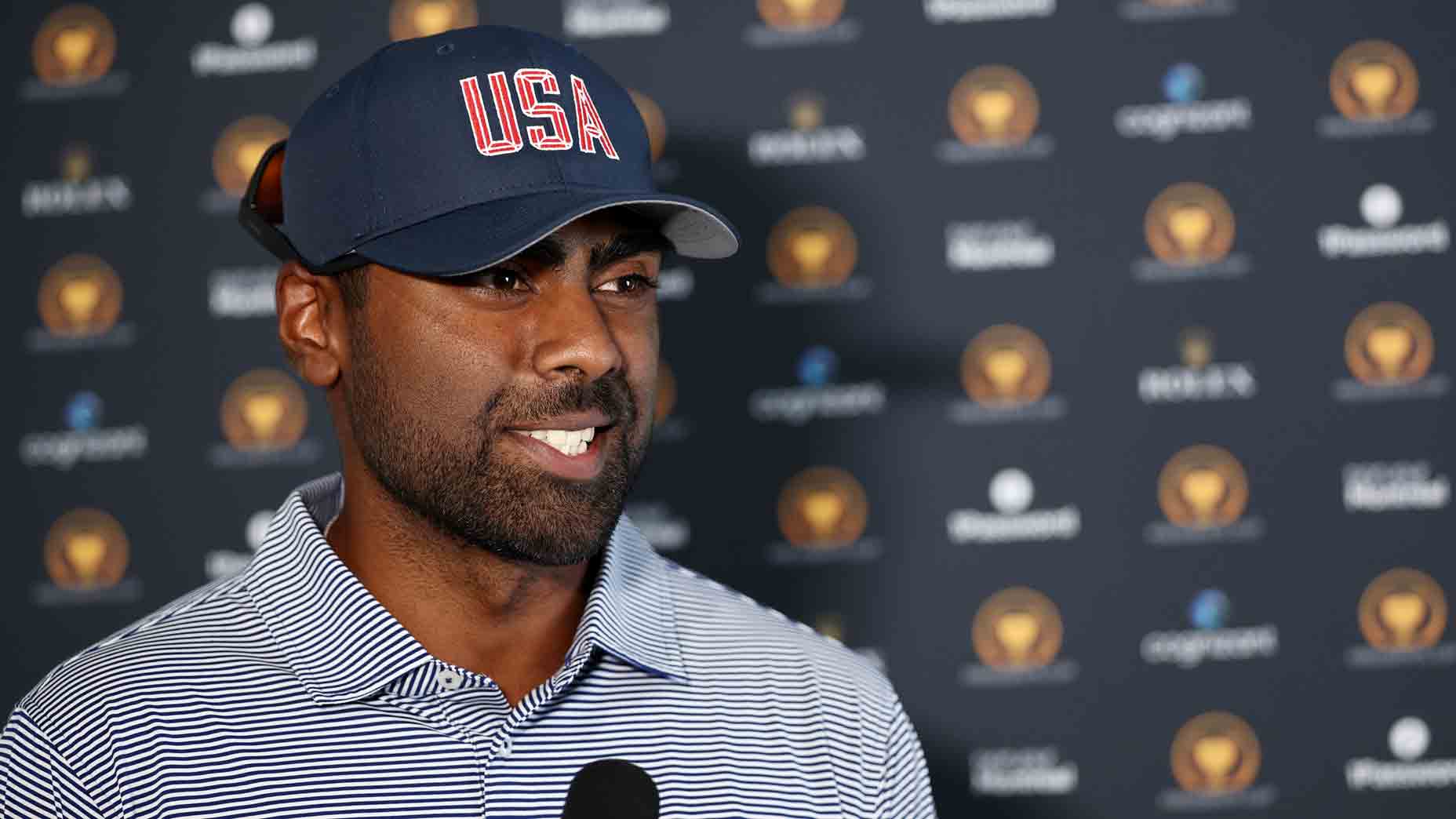
‘He feels like he just wants to spread joy to the world’
Sahith, this being a U.S. presidential year and this being a Presidents Cup, it got me thinking about role models. Who’s your role model and why?
Sahith Theegala: “Yeah, the easy answer for that and my true, honest answer is my father. I wouldn’t say — in a weird way, I wouldn’t say it’s because of what he did for me but more how he treats other people. He makes everyone feel like — and this is not fake at all — he makes everyone feel like your best friend. And it’s not fake at all. He feels like he just wants to spread joy to the world.
“We’re not naive to the world. He’s not naive to the world. Life is hard. Life is hard. And what we’re doing out here kind of feels like a dream sometimes. I’m not saying what we do isn’t hard. I’m just saying that we’re very lucky to be in the position.
“He does such a great job reminding me what life is all about. It’s all about people. And just gotta be nice to people — no matter what the situation is you never know what someone is going through.
“It’s my dad, for his mentality and how to go about life. It’s a team effort. My mom, too. My mom has instilled so many values. She’s a little harder on me than my dad, which I’m very thankful for. It’s a great duo. But one role model, I’d say my father.”
Me: “Do you feel an obligation yourself to be a role model?”
Theegala: “You know what, I don’t feel it as an obligation. I just look at it as I have a really cool platform and it doesn’t take too much effort to spread kindness. And I do try to — I go out of my way sometimes to — sometimes could be a detriment, but say hey to the fans or sign or whatever it might be.
“But I think I’m just lucky that my parents instilled in me at a young age you shake hands, you ask how people are doing. And I do have to remind myself — the big thing for me is, funny enough, the volunteers. There’s so many volunteers out there. These tournaments are impossible without these volunteers. So just the ‘thank yous’ as I’m heading to the tee box or walking off a green or they’re putting a flag down because I’m in the rough a lot. Just a simple thank you.
“And I know how a very small gesture can go a long way. And it’s cool that people can think of me as a role model. I think thinking of yourself as a role model is maybe not the best way to go about it, but you know that people are watching you and you know that kids are watching you and you want to put your best self forward. I feel like my best self forward is just me being me because of how my parents raised me.”
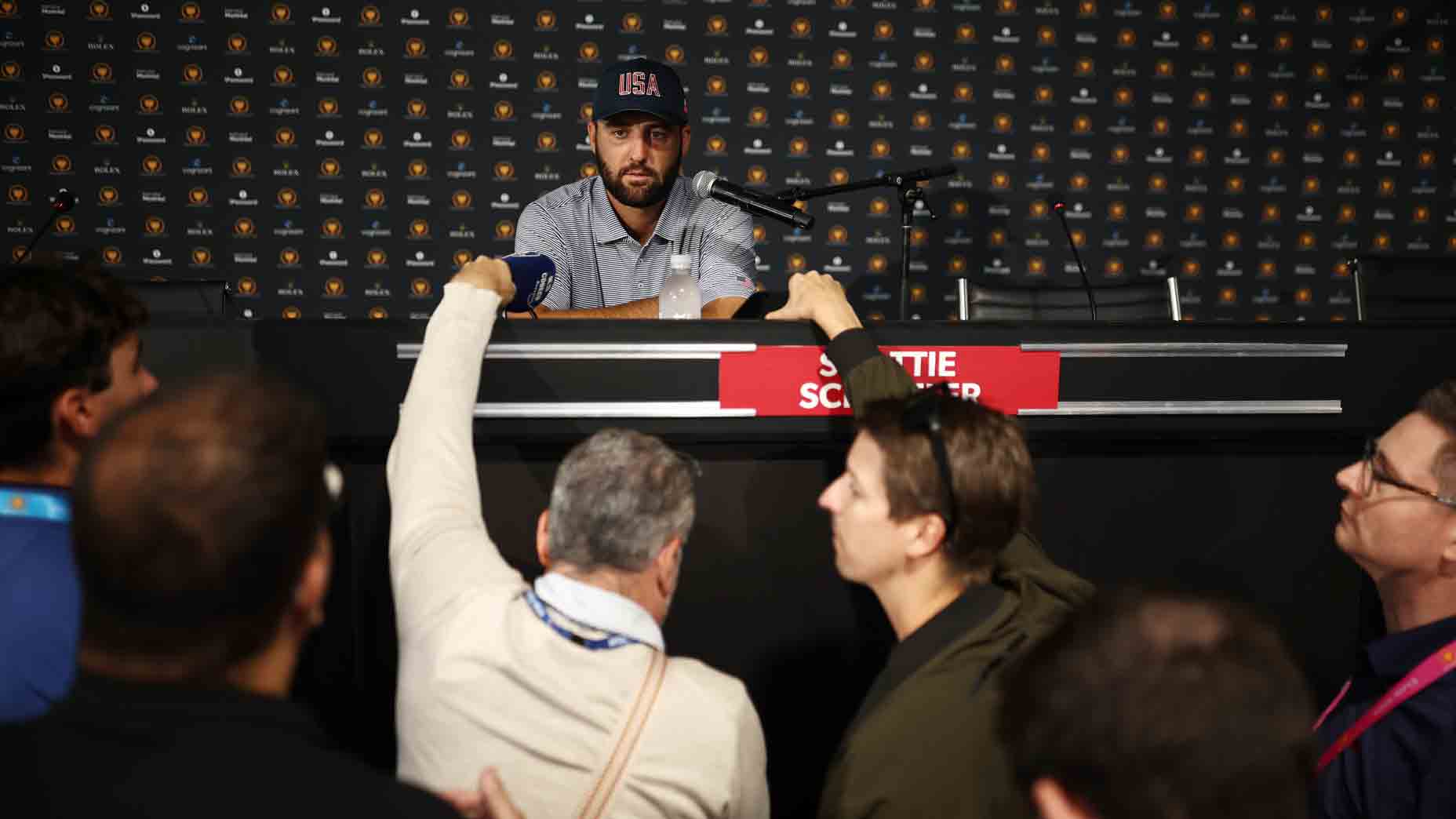
‘I look up to many different people in my life’
Scottie, this being a U.S. presidential election year and this being a Presidents Cup, it got me thinking a little bit about role models. So my question is: Who’s your role model and why?”
Scottie Scheffler: “Who’s my role model and why? I don’t know if I have one specific role model. I look up to many different people in my life.
“If I think about growing up, I had two great parents that I looked up to. I think they raised us right. They taught us right and wrong and taught us how to treat people the right way, I feel like. They did a wonderful job.
“I think of my coach, Randy, who was always like a fun uncle for me growing up. I remember sitting there on the driving range when I was 8 years old, just sitting there, probably from the time I was 6 or 7, just sitting there watching professional golfers go out there and practice with Randy. Those guys were kind enough to let me watch them.
“Like Justin Leonard is an assistant captain this week, and I watched him hit countless balls on the driving range at Royal Oaks, and I sat there and watched. I’m sure I was fairly annoying at times, being a 7-year-old. ‘What are you doing there? What’s with that?’ You can ask him, but I’m sure he got annoyed with me at times, but all those guys were kind enough to let me sit there and watch them. I had a ton of people that I looked up to and was able to learn different things from.”
Me: “I guess along those lines of you following them and getting that memory, do you feel an obligation yourself to be a role model?”
Scheffler: “To be a role model? I try not to think about it. I try to be myself. It’s funny coming full circle and now I’m the guy out there on the driving range and I’ve got younger kids around me that can be annoying at times, but we have fun.
“I think we’ve got a good chemistry, I guess is how you’d say it. When I come home from tournaments, it takes a lot for them to say congratulations. They’d rather give me crap than say congratulations. So I think we have fun. They sit there, and they help me with my practice and challenge me daily.
“If I show up to the course and I’m not hitting it well, I’m going to be hearing it from the peanut gallery behind me on the driving range. It’s really fun seeing it full circle because I know how much it meant to me as a kid to be able to spend time with those guys and have chipping contests and putting contests, and how much I learned, not only about golf, but just about life and how to handle yourself in certain situations.
“So I try to be myself when I’m out there and have fun. I think at times when I was a kid I took myself too seriously. So I think, when you’re a kid, whatever sporting event you’re doing at the time seems like the most important thing in the world. Now being on the other side of it, I try to encourage those guys to go out and enjoy it and have fun and see where stuff can take them.”
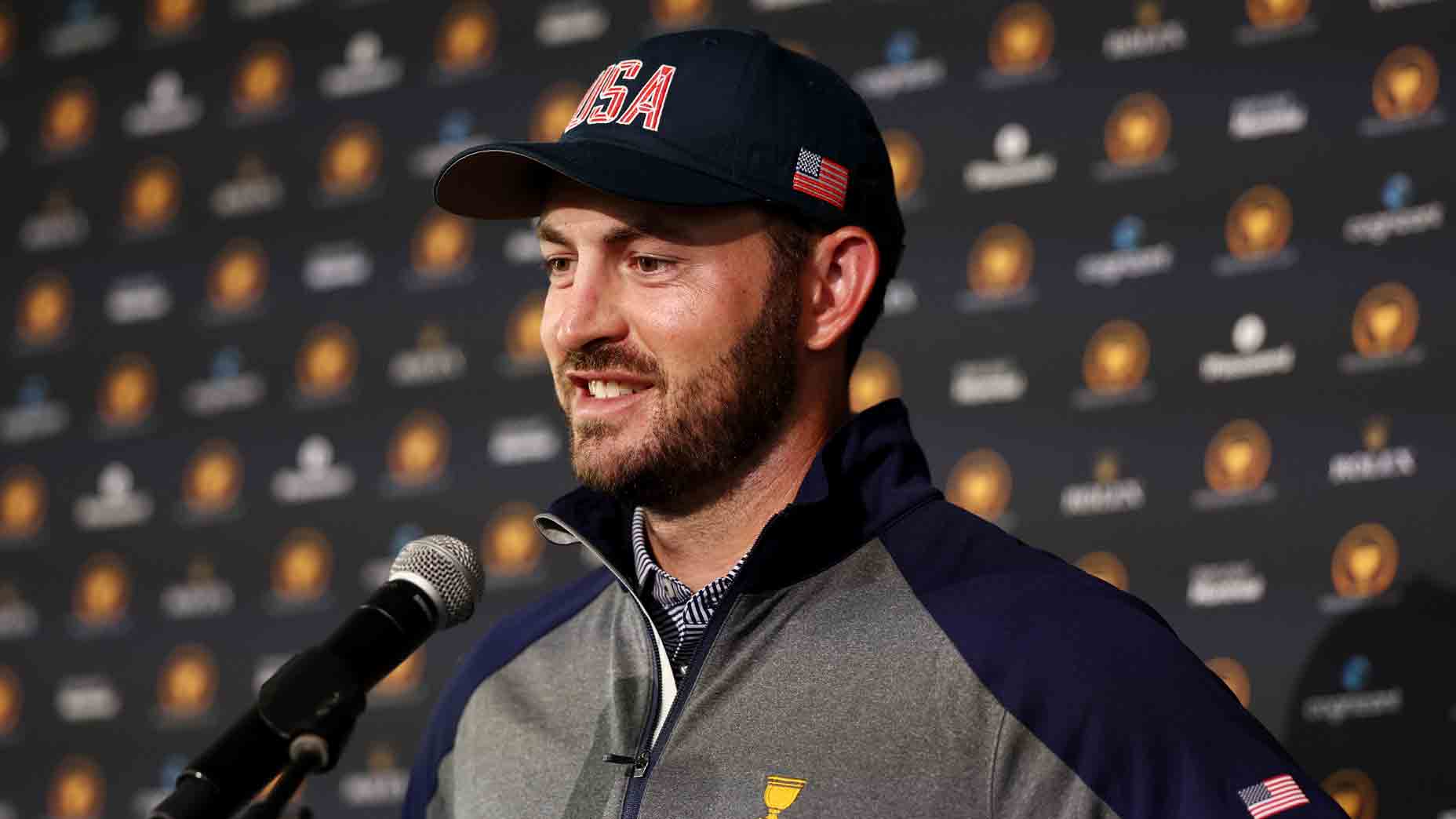
‘When it comes to golf, I would say John Cook and Fred Couples’
Patrick, this being a U.S. presidential election year and this being the President Cup, it got me thinking about role models. Who’s your role model and why?”
Patrick Cantlay: “I think I’ve had a few role models in my life. My dad and my grandfather, for sure. Then when it comes to golf, I would say John Cook and Fred Couples have become mentors for me. This is my first team event without Fred Couples being around. He’s been at every one, and I think he’s walked every one of my team matches since I started in Melbourne. Definitely those individuals.”
Me: “Why your dad and grandfather?”
Cantlay: “Yeah, I spent a lot of time playing golf with my dad and my grandfather growing up, and they definitely instilled in me certain values that they have, respect for the game and the integrity of the game and how that carries over and transitions into just life, having character, and being true to yourself. Spending so much time with them, they just became role models over time.”
Me: Do you feel an obligation yourself to be a role model?
Cantlay: “It’s a good question. I’m not sure when you start becoming a role model and stop looking up to others. I think you’re always striving to pick out the best qualities in others and then embody those. Hopefully if you do a good enough job of that along the way, people may want to emulate you.”
Me: “When you mentioned having a role model versus becoming one, was there a specific moment that you said, this might be that point?”
Cantlay: “I’m not sure. I tend to still be looking up. I have a lot of friends that are older than me that I respect, and I think I’ve learned a lot from them and benefited a great deal from spending time with them.”
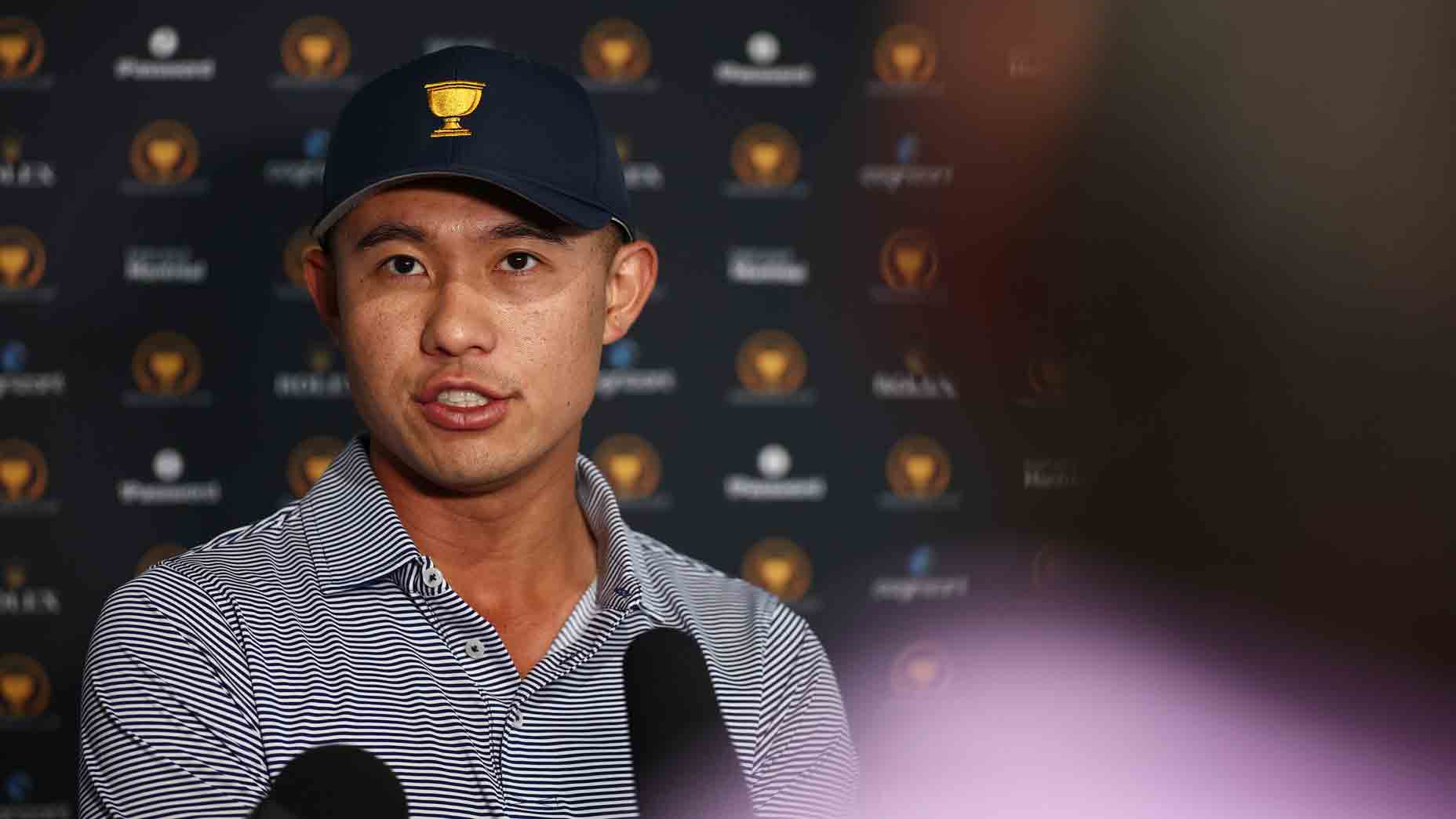
‘Honestly without them, I wouldn’t be here today’
Collin, this being a U.S. presidential election year and this being a Presidents Cup, it got me thinking a little bit about role models. So my question is: Who’s your role model and why?
Collin Morikawa: “I mean, my parents have been incredible role models. They kind of led a path for me to succeed and gave me a lot of opportunities, and I’m thankful for them.
“Honestly without them, I wouldn’t be here today and who I am, so I have a lot to thank both of them for just doing an amazing job and continuing to do an amazing job for myself.”
Me: “Do you feel an obligation to be a role model?”
Morikawa: “I wouldn’t put it as an obligation. I think just where we are with the exposure we get in golf and the eyeballs that are put on us, cameras that are put in front of us, you have to be a certain way and you expect yourself to be a certain way, and you hope to just make a kid’s day or make a kid’s year in some impactful way down the road.
“That’s all you can ask for. What we do, we’re very, very lucky and we know we’re very — there are a lot of things on us and a lot of pressure in many different ways. You hope to just be able to be who you are and be able to represent that as best you can.”
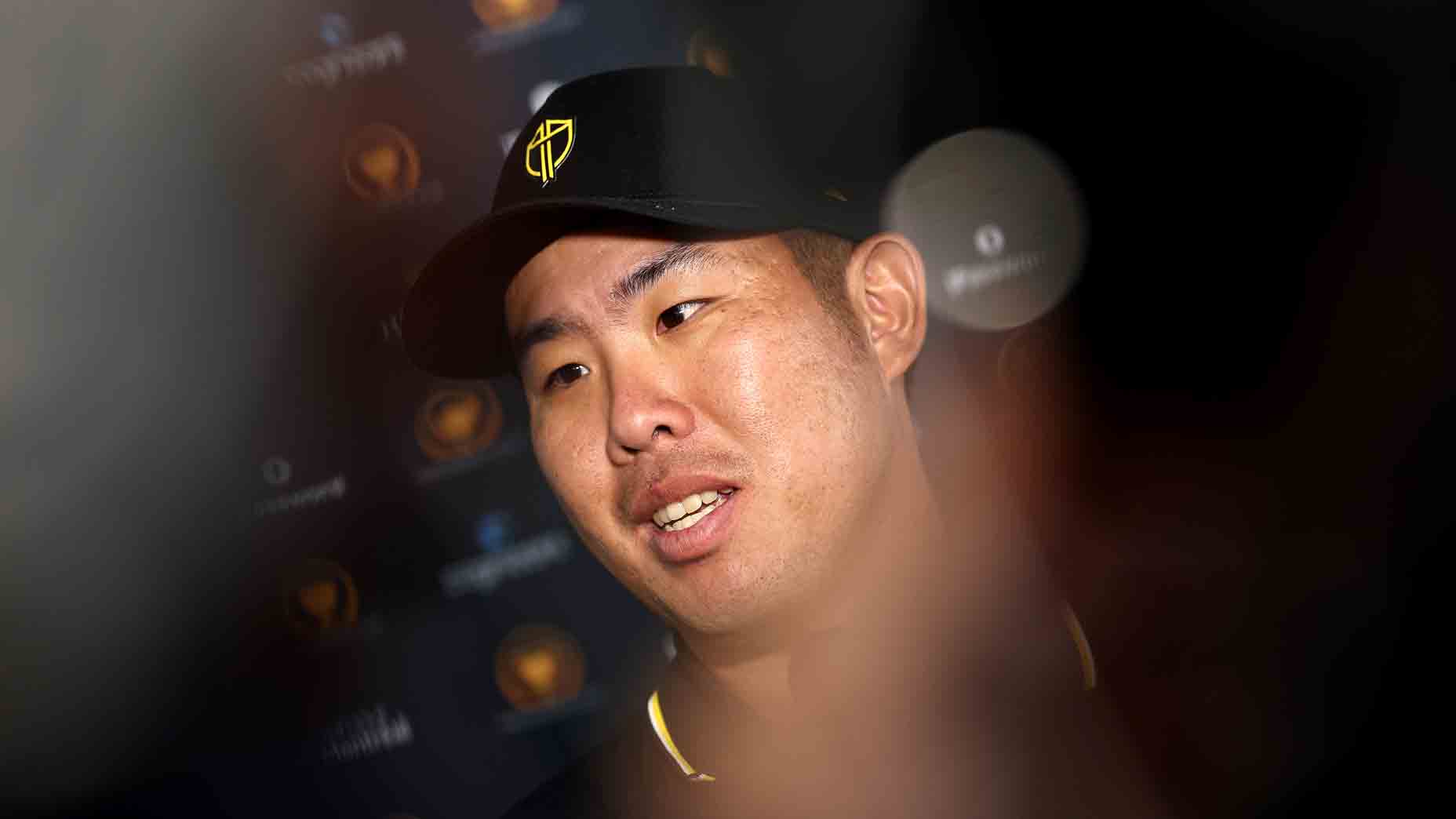
‘I don’t have anybody’
Ben, this being a U.S. presidential election year and this being a Presidents Cup, it got me thinking about role models. Who’s your role model and why?
Ben An: “Oh, role model. In my life or golf or it doesn’t matter?”
Me: “Yeah, it doesn’t matter.”
An: “I don’t have anybody. A bit of everything. Adam Scott is my teammate this week; I’d love to play as good as him and as long as him. This is his 11th Presidents Cup, so hopefully I can play 11 times in my life. That’s a great achievement.
“But role model, I never thought about it. I’ve never had anybody. I just try to be the best version of myself, not trying to be someone else. But golfing, definitely Adam Scott. He’s been playing for a long time.”
Me: “Do you feel an obligation to be a role model?”
An: “No, I don’t think so. Everyone’s different, right? I feel like I don’t need to be someone else. Maybe you’ll have a life model or something you can stick on to, but I feel like everyone is from different families, different cultures, everything, so I don’t really have a role model, but just trying to be better every day.”
Scottie Scheffler on growing up at the range watching pro-golfers and annoying them with questions about their swings. pic.twitter.com/gtoNvNczID
— GOLF.com (@GOLF_com) September 24, 2024
My role model
As for me?
It’s Garry Howard, the once-sports editor of the Milwaukee Journal Sentinel. In college, I worked under him for a stretch, answering calls, typing in scores, getting the occasional byline, which, at that age, was everything. Moms and dads clip those out, and mine certainly did.
But one story stands out, as they often do with role models. Mr. Howard rightfully believed in punctuality and deadlines. My shifts started at 6, and you could be early, but by no means could you be late, so one snowy December night, I left my college apartment at 5, knowing that I’d impress him if I sat down well ahead of time after my 3-mile drive.
But my car, a lovely 1979 Chevrolet Malibu, busted. Turns out the carburetor blew, and I could go only in reverse, which I did, against traffic and parked it, parking tickets be damned. But I had to be on time. Had. To. Non-negotiable. I started running, and, by wild luck, I spotted a high school friend at a stoplight, asked for a ride, got in before an answer and away we went. Nevermind that I hadn’t seen this person since high school, four years earlier. I had to be on time. Had. To. Non-negotiatble.
I got dropped off at 5:59. I was at my desk at 6:02. Whew. Mr. Howard walked out a minute later.
“Piastowski, what time does your shift start?”
Oh no.
“Six,” I answered.
“What time is it now?”
I immediately knew where this was going, then answered.
“6:02.”
“What time is it now?”
I started an excuse. Started. For the next five minutes, I was ripped. I’ve tried to never be late again.
And at the same time, I’ve tried to care and watch out for any and everyone I come across, just as Mr. Howard did for a college fool way back when.
Latest In News
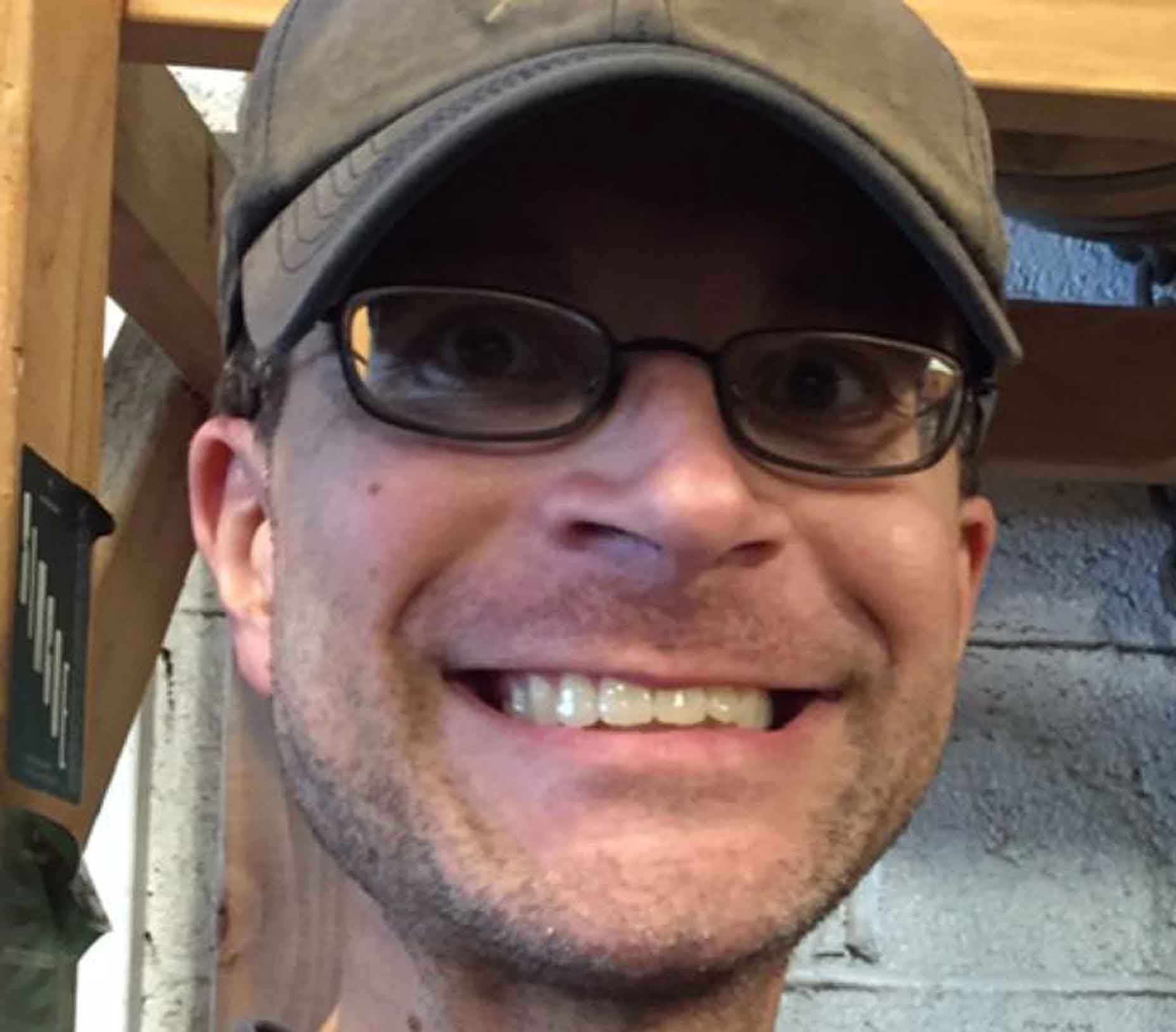
Nick Piastowski
Golf.com Editor
Nick Piastowski is a Senior Editor at Golf.com and Golf Magazine. In his role, he is responsible for editing, writing and developing stories across the golf space. And when he’s not writing about ways to hit the golf ball farther and straighter, the Milwaukee native is probably playing the game, hitting the ball left, right and short, and drinking a cold beer to wash away his score. You can reach out to him about any of these topics — his stories, his game or his beers — at nick.piastowski@golf.com.

